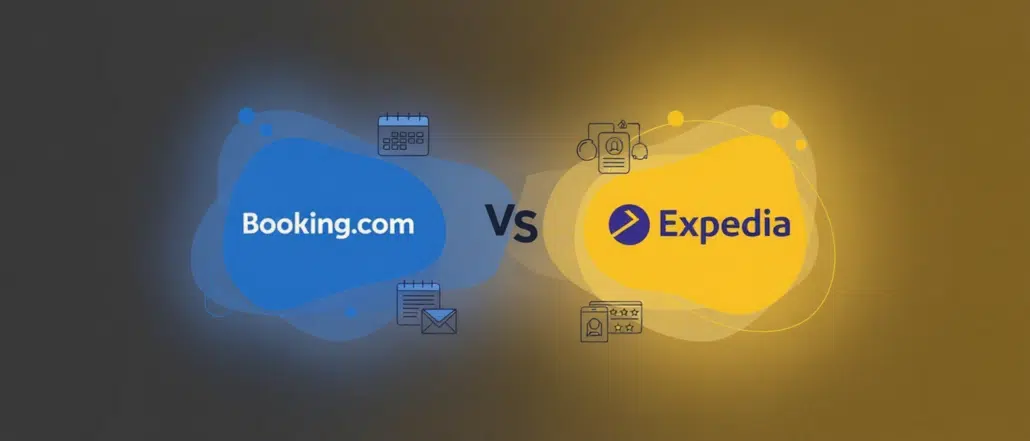When it comes to online travel agencies (OTAs), Booking.com and Expedia are two of the biggest names in the industry. Both offer wide global reach, powerful booking tools, and access to millions of guests. But for vacation rental hosts and hotel owners, choosing between them isn’t just about popularity — it’s about profitability, platform features, support, and control.
In this two-part guide, we’ll compare Booking.com vs Expedia in detail to help you decide which platform is the best fit for your short-term rental business.
We’ll cover:
- Key differences in how each platform operates
- Fees and commission structures
- Host tools and usability
- Guest behavior and loyalty
- Whether Booking.com and Expedia are part of the same company
Let’s start by understanding each platform and how it supports hosts.

What is Booking.com?
Founded in 1996 in Amsterdam, Booking.com is part of Booking Holdings, which also owns Kayak, Priceline, and Agoda. Despite the name similarities, Booking.com is not part of Expedia Group — they are direct competitors.
Booking.com is best known for its strong global reach and its dominance in Europe. As of 2024, it lists more than 28 million properties, including hotels, vacation homes, apartments, and boutique stays. Unlike platforms focused solely on traditional hotels or short-term rentals, Booking.com is hybrid and flexible.
Key features for hosts:
- Commission-based model: Hosts pay a fee per confirmed booking, typically between 10%–20% depending on location and property type.
- Instant book: All bookings are instantly confirmed. This removes friction but can increase the risk of overbookings if not managed properly.
- Guest communication: A centralized inbox allows messaging through the Booking.com Extranet or app.
- Guest reviews: Only guests who stayed can leave a review, adding credibility.
- Custom pricing rules: Hosts can set flexible rates, minimum stays, and seasonal pricing.
- Tools and integrations: Booking.com supports calendar sync, channel managers, and integrations like Guesty’s Booking.com Marketplace plugin.
Pros:
- Large global guest pool
- Excellent visibility, especially in Europe
- Straightforward listing process
- Built-in tools for pricing and calendar management
Cons:
- Commission fees can add up
- No host approval for bookings
- Limited branding and guest relationship-building
What is Expedia?
Expedia was launched in 1996 as a division of Microsoft and is now part of Expedia Group, which owns several brands including Vrbo, Hotels.com, Orbitz, and Travelocity.
So, are Booking.com and Expedia the same company? No — they are separate entities and competitors.
Expedia’s marketplace includes not just hotels and vacation rentals, but also flights, car rentals, and bundled packages. As a result, it attracts both business and leisure travelers looking for one-stop-shop bookings.
Key features for hosts:
- Expedia partner central: A dashboard for managing listings, bookings, pricing, and promotions.
- Commission-based model: Fees range from 10% to 25%, depending on location and listing type.
- Guest reviews: Only verified stays can be reviewed.
- Expedia rewards: A loyalty program that encourages repeat bookings.
- Bundled listings: Travelers booking flights or cars may be shown your property as part of a travel package.
- Integrations: Expedia connects with major channel managers like Guesty’s Expedia integration for streamlined sync.
Pros:
- Huge reach in North America
- Attracts business and package travelers
- Robust support for hotels and multi-unit hosts
- Exposure through Expedia Group’s partner sites
Cons:
- Commission rates can be high
- Interface may be less intuitive for small-scale hosts
- Not as widely used in some European markets
Comparing the two platforms
| Feature | Booking.com | Expedia |
| Ownership | Booking Holdings | Expedia Group |
| Audience | Global, strong in Europe | Global, strong in North America |
| Commission model | 10%–20% per booking | 10%–25% per booking |
| Booking flow | Instant bookings and request to book | Host-configurable (some flexibility) |
| Guest loyalty program | Genius loyalty program | Expedia Rewards |
| Packages (flights + hotel) | Yes | Yes |
| Host tools | Extranet, PMS, Channel manager sync | Extranet, PMS, Channel manager sync |
Is Booking.com or Expedia better for hosts?
If you’re a vacation rental host or small hotel operator trying to decide between Booking.com and Expedia, both platforms offer global reach and robust tools. In Part 1, we covered their core features, pricing structures, and brand differences. Now, let’s dive deeper into how guest behaviors vary, what to consider when choosing between the two, and how superior PMS platforms can help you manage listings across both.
Understanding guest behavior on each platform
Booking.com tends to attract a broad mix of global travelers looking for instant confirmation, free cancellation, and convenience. Many users book directly via mobile apps and often look for hotels and apartments that offer flexibility. Booking.com guests also lean toward spontaneous travel and quick, seamless checkouts.
Expedia is popular among travelers who book bundled trips — combining flights, stays, and car rentals. Many guests use Expedia to redeem loyalty points or shop based on promotions. This makes Expedia especially appealing to international travelers planning full vacations in advance.
The platforms are not part of the same parent company — so for hosts wondering, “Is Booking.com part of Expedia?” The answer is no. Booking.com is owned by Booking Holdings, while Expedia is part of Expedia Group, which owns other brands like Vrbo and Hotels.com.
This distinction is key when planning your multichannel strategy — especially if you want to avoid overlapping inventory on sister platforms (e.g., Expedia and Vrbo).
When to choose Booking.com vs. Expedia
Here’s how to know which platform is a better fit based on your priorities:
Booking.com might be a better fit if:
- You manage urban rentals or boutique hotels that benefit from instant bookings
- You rely heavily on visibility and want to appear in international search results fast
- You want a platform that supports unconventional properties like glamping, cabins, or tiny homes
- You’re looking for a more self-service platform with strong calendar and pricing automation
Expedia might be a better fit if:
- You want to attract longer-stay, bundled vacationers who plan ahead
- Your property fits well within the hotel-like or resort category
- You’re interested in leveraging Expedia’s Rewards Program to capture loyal guests
- You’re listing in a region where Expedia has stronger market dominance or partnerships
Final Thoughts
So, is Booking.com or Expedia better for hosts? The answer depends on your business type, audience, and strategy:
- Use Booking.com for high-volume visibility, flexible stays, and a wide global audience
- Use Expedia for loyalty-driven guests, bundled travel packages, and traditional stays
- Use both to diversify your income and reduce dependence on a single platform
And no — Booking.com and Expedia are not the same company. Listing on both gives you exposure to distinct audiences, and by integrating with a quality property management tool, you can manage them efficiently without doubling your workload.
Want to go deeper? Here are a few helpful reads:
- What is the difference between Booking.com and Airbnb?
- Reducing double bookings on Airbnb and other channels
With the right strategy and the right tools, you don’t have to choose one over the other. You can build a smarter, broader booking strategy — and maximize every opportunity.
